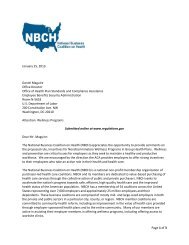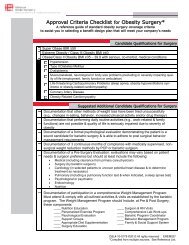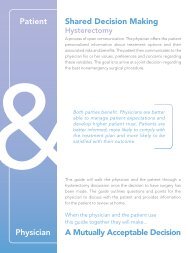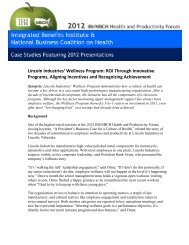Shared Decision Making Patient Physician A Mutually Acceptable ...
Shared Decision Making Patient Physician A Mutually Acceptable ...
Shared Decision Making Patient Physician A Mutually Acceptable ...
You also want an ePaper? Increase the reach of your titles
YUMPU automatically turns print PDFs into web optimized ePapers that Google loves.
Official Recommendations<br />
“Bariatric surgery is the most effective therapy available for morbid obesity and can result in improvement or complete<br />
resolution of obesity comorbidities.”<br />
— American Society of Bariatric Surgeons, 2004<br />
Consensus Conference Statement<br />
“When indicated, surgical intervention leads to significant improvements in decreasing excess weight and comorbidities that<br />
can be maintained over time.”<br />
— American Heart Association, 2011<br />
Bariatric Surgery and Cardiovascular Risk Factors: A Scientific Statement from the American Heart Association<br />
“Bariatric surgery to reduce body weight, improve obesity-associated comorbidities and improve quality of life may be<br />
considered in adult patients with a BMI >40kg/m 2 and those with a BMI >35kg/m 2 with at least one obesity-associated<br />
chronic health condition (i.e., hypertension, type 2 diabetes, dyslipidemia, metabolic syndrome and sleep apnea)…[T]here<br />
is good evidence that…surgical weight loss interventions may improve cardiovascular risk factors, such as hypertension,<br />
dyslipidemia and diabetes mellitus.”<br />
— Dept. of Veterans Affairs, U.S. Dept. of Defense, 2006<br />
Clinical Practice Guideline for Screening and Management of Overweight and Obesity<br />
“Surgery should be considered as a treatment option for patients with a BMI of 40kg/m 2 or greater who instituted but failed<br />
an adequate exercise and diet program…and who present with obesity-related comorbid conditions, such as hypertension,<br />
impaired glucose tolerance, diabetes mellitus, hyperlipidemia and obstructive sleep apnea.”<br />
— American College of <strong>Physician</strong>s, 2005<br />
Pharmacologic and Surgical Management of Obesity in Primary Care: A Clinical Practice Guideline<br />
“Bariatric surgery should be considered for adults with BMI ≥35kg/m 2 and type 2 diabetes, especially if the diabetes is<br />
difficult to control with lifestyle and pharmacologic therapy.”<br />
“Bariatric surgery is an appropriate treatment for people with type 2<br />
diabetes and obesity not achieving recommended treatment targets<br />
with medical therapies.”<br />
— International Diabetes Federation, 2011<br />
Bariatric Surgical and Procedural Interventions in the Treatment of<br />
Obese <strong>Patient</strong>s with Type 2 Diabetes<br />
“The beneficial effect of surgery on reversal of existing DM and prevention<br />
of its development has been confirmed in a number of studies.”<br />
— American Association of Clinical Endocrinologists, 2011<br />
— American Diabetes Association, 2009<br />
Standards of Medical Care in Diabetes<br />
Informational Websites<br />
www.win.niddk.nih.gov/publications/gastric/htm<br />
www.smarterpatient.com/gastricbypass<br />
www.obesityaction.org/weightlossoptions/bariatricsurgery.php<br />
www.asmbs.org/Newsite07/patients/benefits.htm<br />
www.acsbscn.org/Public/index.jsp<br />
www.stopobesityalliance.org/blog/not-all-hearts-are-created-equal/









